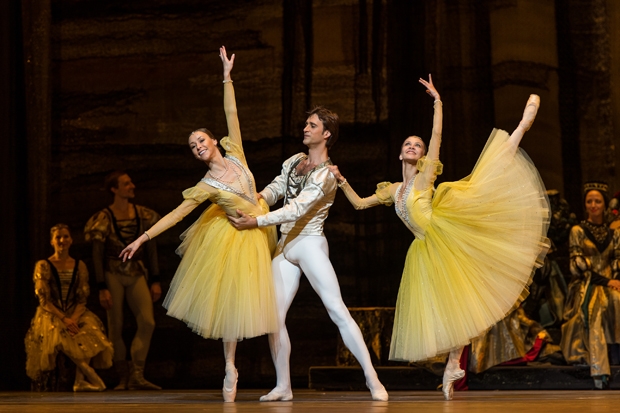In 2013, Pavel Dmitrichenko, disgruntled principal dancer of the Bolshoi, exacted a now infamous revenge on the company’s artistic director, Sergey Filin, for overlooking his girlfriend in casting the starring role in that most Russian of ballet classics, Swan Lake. The circumstances surrounding the acid attack, which seemed to combine ballet’s glamour with a murky underworld of intrigue, conspiracy, villains and victims, quickly became a contemporary metaphor for the Bolshoi itself. It’s irresistible as a lens through which to consider this intriguing institution at the heart of Russian politics, culture and life.
The 2015 film Bolshoi Babylon started from this point, and went on to capture the ensuing year, its crew and their cameras given full access to life backstage. This was unprecedented, but particularly astonishing at the time, given that the attack’s sting was still keenly felt across the theatre.
Bolshoi Confidential also takes the incident as its starting point, but makes the case that far from being an ‘awful aberration, the attack had precedents of sorts in the Bolshoi’s rich and complicated past’. Certainly the intensive archive research on which the book is based reveals the Bolshoi’s history to be a catalogue of lurid and vivid episodes, from the (vaguely comedic) incident of the apple thrown at Luisa Weiss by her rival’s fans, to the brutal executions of the Stalinist era. But how-ever devastating its impact on Filin himself, Dmitrichenko’s attack — petty in its genesis and amateurish in its execution — may, in the long run, turn out to play little more than a bit part in the Bolshoi’s history. Presenting Bolshoi Confidential through the prism of the 2013 incident might help to bring it to wider audiences, but the story it tells could easily stand alone.
The book’s neatly crafted introduction is structured like a Tchaikovsky overture, setting out the central theme, then presenting key characters that will feature in the chapters that follow. Some 400 pages later, an epilogue brings past and present together to present Morrison’s own views on where Russian ballet might find its future (in New York, with choreographer Alexei Ratmansky).
What comes between is, despite its rich detail, impressionistic. As Morrison says:
The story of the Bolshoi Theatre, its ballet, Russia and Russian politics can only be traced in gestures and revealed against mottled backgrounds in occasional close ups.
Against a bubbling backdrop, Morrison brings his chosen characters forward for their moment in the spotlight. The first half takes us from the Bolshoi’s 1776 beginning to the abdication of Tsar Nicholas II in March 1917. It starts with the extraordinary tale of Michael Maddox — the English-born entertainer who made his way from the stages of 1750s London to become the licence-holder for the first Bolshoi Theatre (known as the Petrovsky) and producer of over 400 ballets, operas and dramas — and travels through Napoleon’s taking of Moscow to imperial Russia, via key figures in the theatre’s history. Among both famous and lesser-known names I particularly noted Félicité Hullen, the Parisian-born ballerina who choreographed Cinderella in 1825. A female creating for a major ballet company is a rarity in the 21st century; to find that the second Bolshoi theatre opened with a ballet by a woman is astounding.
The second half takes us beyond the Bolsheviks and through the Iron Curtain years to finish with a long chapter centred on Maya Plisetskaya, a dancer who ‘emblematised the power and the might of the Bolshoi Ballet in the mid-20th century’. Not only did Plisetskaya possess the ‘vigour, lustre, fearlessness and showiness’ of the Bolshoi style; she also had a father who disappeared during the Stalinist purges, impeccable balletic lineage through her mother’s family (the Messerers), apparently close links with the Kremlin and an international touring schedule that, while normal for ballet’s stars today, was decidedly abnormal in the Soviet era. A recording of Plisetskaya in Swan Lake was regularly broadcast at the deaths of Soviet leaders: ‘To turn on the television and see Plisetskaya […] meant something big was happening.’ This still held true in August 1991, when the attempted coup against Gorbachev saw tanks roll into Moscow and Plisetskya’s Swan Lake ‘shown repeatedly on every channel’.
Given this wealth of detail, it feels churlish to wish for even more. But I’d have liked a fuller explanation of the unlikely survival of ballet — an art form that is almost the living embodiment of imperial Russia — in the post-revolutionary Soviet Union (a subject particularly well covered by Christina Ezrahi in her 2012 Swans of the Kremlin); or more insight on the contribution of the Bolshoi’s history to the dancing itself. Bolshoi means many things — politics and theatre among them — but it is also an artistic style. The book touches on what lies behind the dancers’ ‘collective soul’, but key elements are skimmed over: the Vaganova training method, or the mentoring system that sees tradition passed from generation to generation, equipping Russian dancers with an innate sense of how to ‘be’ on the stage that seems denied to the rest of us. When the former Bolshoi star Irek Mukhamedov joined the Royal Ballet in 1990 (arguably past his youthful prime) I observed at first hand the way in which he could still silence the theatre and draw all eyes to himself without dancing a single step.
Despite my 35 years as a dancer, the Bolshoi style would not give up its secrets easily and I suspect this is true, to some extent, of the Bolshoi itself. ‘Russia has always been good at generating multiple meanings, conceiving competing realities, insinuating that we might never know the truth, that there might not be any truth at all.’ Morrison reminds readers of Churchill’s description of Russia as ‘a riddle wrapped in a mystery inside an enigma’. Bolshoi Confidential offers a fascinating window into the world’s most famous ballet theatre, but it’s too much to ask that it should unlock the Bolshoi itself.






Comments